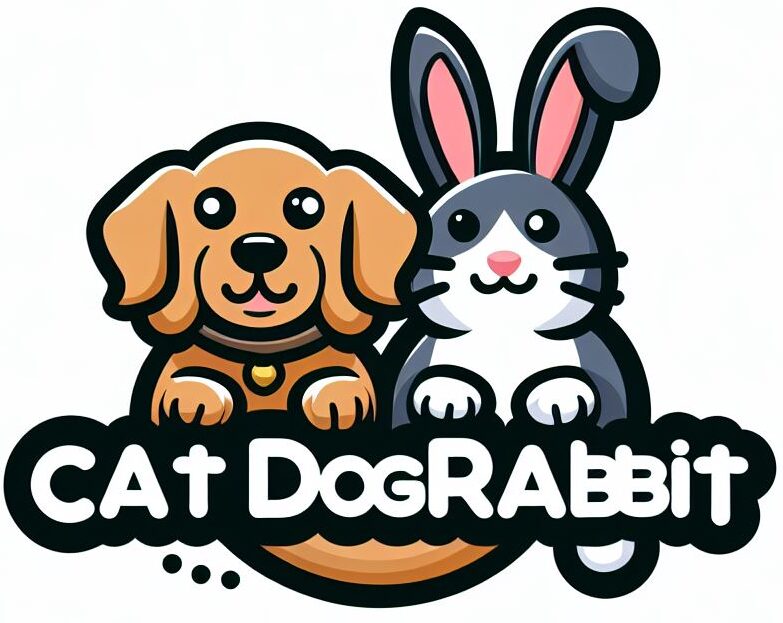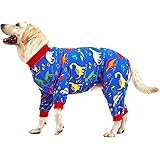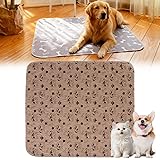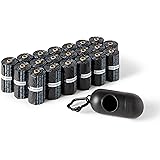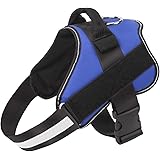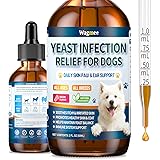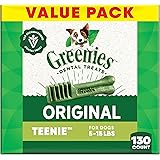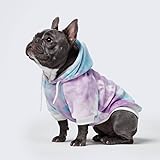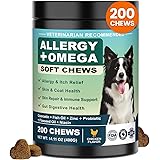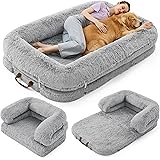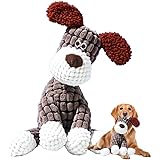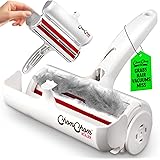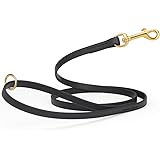
LovinPet Pitbull Large Dog Clothes, Wound Care/Post Surgery Dog Clothes, Lost World Dinosaurs Print, UV Protection, Pet Anxiety Relief, Large Dog Onesies, Pet PJ's /2XL
$28.49 (as of 02/08/2026 14:12 GMT +00:00 - More infoProduct prices and availability are accurate as of the date/time indicated and are subject to change. Any price and availability information displayed on [relevant Amazon Site(s), as applicable] at the time of purchase will apply to the purchase of this product.)Puppy Pads with pheromones, 2026 Upgraded Washable Puppy Pads for Dogs & Cats, Pee Pad - Leak & Odor Waterproof, Non-Slip Base, Easy to Clean & Reusable (Brown-A, M: 27.6" × 31.5")
$46.99 (as of 02/08/2026 14:07 GMT +00:00 - More infoProduct prices and availability are accurate as of the date/time indicated and are subject to change. Any price and availability information displayed on [relevant Amazon Site(s), as applicable] at the time of purchase will apply to the purchase of this product.)Amazon Basics Dog Poop Bags with Dispenser, 300 Count, Enhanced for Guaranteed Leakproof, Unscented, Includes Leash Clip
$8.95 (as of 02/08/2026 14:07 GMT +00:00 - More infoProduct prices and availability are accurate as of the date/time indicated and are subject to change. Any price and availability information displayed on [relevant Amazon Site(s), as applicable] at the time of purchase will apply to the purchase of this product.)Blue Buffalo Bits Soft Dog Treats for Training, Made with Natural Ingredients & Enhanced with DHA, Chicken Recipe, 19-oz Bag
$14.98 (as of 02/08/2026 14:07 GMT +00:00 - More infoProduct prices and availability are accurate as of the date/time indicated and are subject to change. Any price and availability information displayed on [relevant Amazon Site(s), as applicable] at the time of purchase will apply to the purchase of this product.)Bolux Dog Harness, No-Pull Reflective Dog Vest, Breathable Adjustable Pet Harness with Handle for Outdoor Walking - No More Pulling, Tugging or Choking (Blue, S)
$11.19 (as of 02/08/2026 14:12 GMT +00:00 - More infoProduct prices and availability are accurate as of the date/time indicated and are subject to change. Any price and availability information displayed on [relevant Amazon Site(s), as applicable] at the time of purchase will apply to the purchase of this product.)Natural Yeast Relief for Dogs, Supports Itch & Allergy Relief, Eases Ear Paw Discomfort for Dog, Supports Immune System Yeast Inflammation – 60ml Bacon Flavor
$16.99 (as of 02/08/2026 14:07 GMT +00:00 - More infoProduct prices and availability are accurate as of the date/time indicated and are subject to change. Any price and availability information displayed on [relevant Amazon Site(s), as applicable] at the time of purchase will apply to the purchase of this product.)Ameritex Waterproof Dog Bed Cover Pet Blanket for Furniture Bed Couch Sofa Reversible
$7.19 (as of 02/08/2026 14:12 GMT +00:00 - More infoProduct prices and availability are accurate as of the date/time indicated and are subject to change. Any price and availability information displayed on [relevant Amazon Site(s), as applicable] at the time of purchase will apply to the purchase of this product.)Greenies Veterinarian-Recommended Adult Natural Dental Dog Treats Teenie Size, Dog Dental Chews, Original Flavor, 36 oz. Pack, 130 Count
$25.99 (as of 02/08/2026 14:07 GMT +00:00 - More infoProduct prices and availability are accurate as of the date/time indicated and are subject to change. Any price and availability information displayed on [relevant Amazon Site(s), as applicable] at the time of purchase will apply to the purchase of this product.)Spark Paws Dog Hoodie – Premium Dog Sweater for Small, Medium, and Large Dogs | Warm Outfits for French Bulldogs, Pitbull, Puppy, Winter Jacket Alternative - 90s Retro Sky Dye - XL
$22.99 (as of 02/08/2026 14:12 GMT +00:00 - More infoProduct prices and availability are accurate as of the date/time indicated and are subject to change. Any price and availability information displayed on [relevant Amazon Site(s), as applicable] at the time of purchase will apply to the purchase of this product.)Welcoming a new puppy into your home is an exciting and joyful experience. However, it also comes with a great deal of responsibility. Caring for a 6-week-old pup requires understanding their unique needs and providing them with the proper care and attention they require at this stage of their development.
At 6 weeks old, puppies are still very young and are just beginning to explore the world around them. They are learning important socialization skills and are starting to develop their own personalities. It is crucial to provide them with a safe and nurturing environment where they can grow and thrive.
Key Takeaways
- Feeding your 6-week-old pup requires a balanced diet of puppy-specific food and frequent meals.
- Establishing a routine for your pup’s health and wellness includes regular vet check-ups and vaccinations.
- Socializing your pup early on can lead to a happy and confident dog in the future.
- House training your 6-week-old pup requires patience, consistency, and positive reinforcement.
- Creating a safe and comfortable home environment for your pup includes puppy-proofing and providing a cozy sleeping area.
Feeding Your 6-Week-Old Pup: What You Need to Know
Choosing the right food for your 6-week-old pup is essential for their growth and development. Look for high-quality puppy food that is specifically formulated for their age and breed. Avoid feeding them adult dog food, as it may not provide the necessary nutrients they need at this stage.
Puppies at this age should be fed small, frequent meals throughout the day. Aim to feed them four to six times a day, gradually reducing the frequency as they get older. It is important not to overfeed your pup, as this can lead to obesity and other health issues. Follow the feeding guidelines on the puppy food packaging and consult with your veterinarian if you have any concerns.
Establishing a Routine for Your Pup’s Health and Wellness
Setting a routine for your pup’s health and wellness is crucial in ensuring their overall well-being. This includes establishing a schedule for feeding, exercise, playtime, and rest.
Feeding your pup at regular intervals helps regulate their digestion and prevents overeating. It also helps establish a sense of structure and routine in their daily lives. Along with regular feeding, it is important to schedule regular vet check-ups and vaccinations to keep your pup healthy and protected against common diseases.
In addition to physical health, mental stimulation is also important for your pup’s well-being. Engage them in interactive play, provide them with puzzle toys, and introduce them to new experiences and environments. This will help build their confidence and prevent boredom.
Socializing Your Pup: Tips for a Happy and Confident Dog
| Topic | Metric |
|---|---|
| Socialization | Number of socialization sessions per week |
| Training | Percentage of successful training sessions |
| Playtime | Amount of playtime per day |
| Exercise | Number of walks per day |
| Behavior | Number of positive behaviors exhibited per day |
Socialization is a critical aspect of raising a well-rounded and confident dog. It is important to expose your 6-week-old pup to a variety of people, animals, and environments to help them develop positive associations and reduce the risk of fear or aggression later in life.
Introduce your pup to new people and animals gradually and in a controlled manner. Start with familiar faces and then gradually introduce them to new individuals. Encourage positive interactions by rewarding good behavior with treats or praise.
Socialization exercises such as puppy classes or playdates can also be beneficial for your pup’s development. These activities provide opportunities for them to interact with other puppies and learn appropriate social skills.
House Training Your 6-Week-Old Pup: Dos and Don’ts
House training your 6-week-old pup can be a challenging task, but with patience and consistency, it can be accomplished successfully. Understanding your pup’s bathroom needs is crucial in preventing accidents in the house.
Puppies have small bladders and need to eliminate frequently. Take your pup outside to their designated bathroom area every couple of hours, as well as after meals, naps, and playtime. Be patient and give them plenty of time to do their business.
Positive reinforcement techniques are key when house training your pup. Reward them with treats or praise when they eliminate outside, and avoid punishing or scolding them for accidents indoors. Consistency is key in establishing good bathroom habits, so be sure to follow the same routine every day.
Creating a Safe and Comfortable Home Environment for Your Pup

Creating a safe and comfortable home environment is essential for your pup’s well-being. Puppy-proofing your home is crucial to prevent accidents and keep them safe.
Remove any toxic plants, chemicals, or small objects that your pup could swallow. Secure electrical cords and keep them out of reach. Block off any areas that may be hazardous or inaccessible to your pup.
Providing a comfortable sleeping area is also important. Choose a quiet and cozy spot where your pup can rest undisturbed. Consider using a crate or a designated puppy bed to create a sense of security and routine.
Toys and chew items are essential for your pup’s mental and physical stimulation. Provide them with a variety of toys to keep them entertained and prevent destructive behavior. Be sure to choose toys that are appropriate for their age and size to avoid choking hazards.
Exercise and Playtime: How Much is Enough for Your Pup?
Exercise and playtime are important for your pup’s physical and mental well-being. However, it is important to understand their exercise needs and avoid over-exercising them at this young age.
Puppies have lots of energy, but their growing bodies are still developing. Short, frequent play sessions throughout the day are more beneficial than long, intense exercise sessions. Aim for 10-15 minutes of playtime several times a day, gradually increasing the duration as they get older.
Engage your pup in activities that stimulate their mind and body, such as fetch, tug-of-war, or puzzle toys. This will help tire them out mentally and prevent boredom.
Common Health Issues to Look Out for in 6-Week-Old Pups
It is important to be aware of common health issues that can affect 6-week-old pups. Keep an eye out for signs of illness or discomfort and seek veterinary care if necessary.
Common health issues in puppies include parasites such as fleas, ticks, and worms. Regular vet check-ups and preventative treatments can help keep these issues at bay.
Other health concerns to watch out for include respiratory infections, gastrointestinal issues, and skin problems. It is important to monitor your pup’s behavior, appetite, and bathroom habits for any changes that may indicate a health problem.
Grooming Your Pup: Bathing, Brushing, and Nail Trimming
Regular grooming is important for your pup’s hygiene and overall health. Bathing, brushing, and nail trimming are all part of a good grooming routine.
Bathing your pup should be done as needed, typically every 4-6 weeks. Use a gentle puppy shampoo and warm water to avoid drying out their skin. Be sure to rinse thoroughly to remove all soap residue.
Brushing your pup’s coat helps remove loose hair and prevents matting. Use a brush or comb that is appropriate for their coat type and brush in the direction of hair growth. Start slowly and gradually increase the duration of brushing sessions as your pup gets used to it.
Nail trimming is important to prevent overgrowth and discomfort. Use a pair of dog nail clippers or a grinder specifically designed for dogs. Be cautious not to cut too close to the quick, which can cause bleeding and pain. If you are unsure, consult with a professional groomer or veterinarian for guidance.
Training Your Pup: Basic Commands and Positive Reinforcement Techniques
Training your 6-week-old pup is an important part of their development. Basic commands such as sit, stay, and come are essential for their safety and well-being.
Positive reinforcement techniques are the most effective way to train your pup. Reward good behavior with treats, praise, or playtime. Avoid punishment or harsh training methods, as these can lead to fear or aggression.
Consistency is key when training your pup. Use the same commands and rewards consistently to reinforce their understanding. Keep training sessions short and fun, and always end on a positive note.
In conclusion, caring for a 6-week-old pup requires understanding their unique needs and providing them with the proper care and attention. By following these tips and guidelines, you can ensure that your pup grows up to be a happy and healthy dog. Remember to be patient, consistent, and loving in your approach, and enjoy the journey of raising your new furry friend.
FAQs
What is the average weight of a 6 week old puppy?
The average weight of a 6 week old puppy varies depending on the breed, but it is typically between 6-16 pounds.
What should a 6 week old puppy be eating?
A 6 week old puppy should be eating a high-quality puppy food that is specifically formulated for their nutritional needs. They should be fed small, frequent meals throughout the day.
When should a 6 week old puppy be vaccinated?
A 6 week old puppy should receive their first round of vaccinations, which typically includes the distemper, parvovirus, and adenovirus vaccines.
How often should a 6 week old puppy be taken outside to go potty?
A 6 week old puppy should be taken outside to go potty every 2-3 hours during the day, and once or twice during the night.
What kind of socialization should a 6 week old puppy receive?
A 6 week old puppy should be exposed to a variety of people, animals, and environments to help them develop social skills and confidence. This can include supervised playtime with other puppies, meeting new people, and going on short car rides.
When should a 6 week old puppy be weaned?
A 6 week old puppy should begin the weaning process, which involves gradually introducing solid food and reducing their dependence on their mother’s milk. This process typically takes 2-4 weeks.
